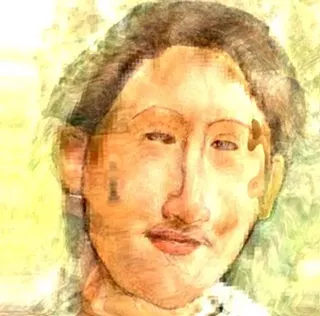The Alternative Theatre Company takes a particular interest in gay themes and characters, but most of its material should have a broad general appeal, and none more so than Beyond Therapy, which Marshall admits is a "safe" choice; it tosses gay, straight and bisexual characters together in a farrago of relationship dysfunction that can amuse and appall just about anybody.
Despite the fact that the play begins and ends in a restaurant named The Restaurant, the characters aren't reduced to generic types, except insofar as farce demands a certain simplification and shorthand. The lights come up on Bruce and Prudence meeting in the restaurant; Prudence has responded to Bruce's personal ad, and the conversation is initially superficial and tentative. Prudence should know something's up when Bruce blurts out, "I hope I'm not too macho for you," as if such a thing would cross anybody's mind. He's a bit self-conscious, you see, because he has a male lover at home. Bruce's therapist has urged him to open up emotionally, take risks--meet women. Bruce is perfectly above-board about all of this, but Prudence is dismayed. Bruce weeps. Prudence declares, "I don't think men should cry unless something falls on them." Bruce accuses Prudence of sexism. Water is thrown in faces. The date ends prematurely.
That's not the only thing that has ended prematurely. Prudence's therapist, Stuart, has an ejaculation problem, which we know, because he seduced Prudence after their second session. They're no longer an item, but Prudence still comes in for treatment, even though the rebuffed Stuart is likely to blurt out, midsession, "Fuck you, cunt!"
Bruce's therapist, Charlotte, is even worse. She advocates passionate action, but she has trouble remembering exactly which patient she's talking to. She's self-absorbed, has the attention span of an accelerated particle, claims to suffer from a blood-sugar problem and is given to verbal paraphasia; she says "porpoise" for "patient," "dirigible" for "secretary." Perhaps when she says "therapy," she means "malpractice."
Eventually, we also meet Bruce's lover, Bob, who is, to say the least, not supportive of this course of therapy. He calls his mother to complain, and when the going gets tough, she starts singing showtunes, especially "Rose's Turn" from Gypsy. No wonder Bob is gay.
Durang calls Beyond Therapy one of his "sunnier" comedies. It's certainly not as bitter and mean as The Marriage of Bette and Boo, but neither does it wrap itself up in a predictable romantic-comedy ending. The trouble here is an inconsistent tone; Bruce and Prudence are fairly ordinary people, especially as played in this Alternative Theatre Company production, but Stuart and particularly Charlotte are utter whack jobs. How could they exist in the same universe?
The play was written and remains set in the 1980s, and its references to Shaun Cassidy and Three's Company make it seem more and more like a period piece. But questionable advice from pop-psychology experts will always be with us, as will dysfunctional romantic relationships, which have been theatrical fodder ever since Oedipus.
The Alternative Theatre Company production features Steve Wood as Bruce. Wood has been ubiquitous in the past few months, recently featured in Studio Connections' Tick, Tick ... Boom! and in Homoneuroic 2. On the evidence of those shows and Beyond Therapy, he's starting to be typecast as a mundane young gay guy, invested in the social establishment, whose few hang-ups result in a certain stiffness. Think of him as a combination of the two Darrins in Bewitched: uptight like Dick York, but discreetly gay like Dick Sargent.
Wood doesn't have a whole lot of romantic chemistry with Maria Alburtus as Prudence, but perhaps that's the point. These characters clearly are not meant for each other. They do develop the right kind of tension together, and settle nicely into the emotional ambiguity of the play's last scenes. When Prudence gets peeved, which is often, Alburtus narrows her mouth to a tight little line which, below her large eyes, makes her look a little like Bette Davis--a sure sign of danger right there.
Heather Van Houten threatens to run away with the show; Durang requires her character, Charlotte, to start over-the-top and jump even higher from there, and Van Houten complies. She is utterly disengaged from the other characters, staring into space when they speak to her, turning every conversation around to herself, blurting out inappropriate comments and dubious advice like a Tourette patient who's been reading too much Psychology Today.
Chadwyk Collins is the smug prick he needs to be as Stuart, but he drifts off toward the end when Durang forgets to give his character something interesting to do. Scott O'Brien and Alex Smith round out the cast, all ably directed by Joe Marshall, who aside from fostering Van Houten's unpredictability, tries to keep the other characters grounded in the real world.
Well, as real as Christopher Durang's world can be.








